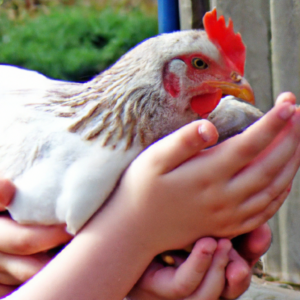
If you have a chicken coop, you probably know how important it is to keep your feathered friends safe and happy. One challenge that many chicken owners face is protecting their coop from pesky rodent infestations. These unwelcome visitors can wreak havoc in the coop, stealing eggs, eating feed, and even posing a threat to the health of your chickens. But don’t worry, there are simple and effective measures you can take to safeguard your chickens and keep those rodents at bay. In this article, we will explore some helpful tips and strategies to ensure that your coop remains a safe and rodent-free haven for your beloved chickens.

Proper Coop Construction and Maintenance
Solid Foundation
When constructing a chicken coop, it is essential to start with a solid foundation. Ensure that the coop is built on level ground, and consider using materials that are resistant to damage and decay. A solid foundation will help prevent rodents from burrowing their way into the coop.
Secure Walls and Floors
To effectively protect your chickens from rodent infestations, it is crucial to have secure walls and floors. Use sturdy materials that rodents cannot chew through, such as metal or thick wood. Inspect regularly for any signs of damage or weak spots that may allow rodents to enter.
Seal All Entry Points
Rodents can find even the tiniest openings to enter the coop. Seal all entry points, including gaps around doors, windows, and vents. Use materials like steel wool or caulk to close off any potential access points. Remember, even a small gap can provide an entryway for a determined rodent.
Regular Cleaning and Maintenance
Maintaining a clean and well-maintained coop is essential for preventing rodent infestations. Regularly clean the coop, removing waste, spilled food, and nesting materials. This reduces the attraction for rodents while also promoting a healthy environment for your chickens.
Food Storage and Handling
Use Secure Containers
Proper food storage is vital to deter rodents from entering the coop. Use secure containers, such as metal bins with tight-fitting lids, to store chicken feed. Rodents are notorious for gnawing through plastic bags, so using sturdy containers will help keep them at bay.
Store Feed Properly
In addition to using secure containers, it is crucial to store feed properly. Keep feed off the ground by using raised platforms or hanging feeders. This makes it more difficult for rodents to access the feed and minimizes the chances of contamination.
Clean Feeding Areas
Regularly clean the feeding areas to remove any leftover feed or spills. Rodents are attracted to food sources, so keeping the feeding areas clean prevents them from lingering around the coop. Use a broom or vacuum to sweep up any food debris, and consider using a tray or mat to catch spills.
Eliminate Spilled Food and Waste
Spilled food and waste act as magnets for rodents. Make sure to promptly clean up any spilled food or waste to reduce the attraction for rodents. Regularly inspect the surrounding areas outside the coop to remove any spilled feed or waste that may have accumulated.

Rodent-Proof Equipment and Accessories
Rodent-Proof Feeders and Waterers
Investing in rodent-proof feeders and waterers is an effective way to protect your chickens’ food and water from being contaminated or accessed by rodents. Look for designs that have mechanisms to prevent rodents from accessing the feed or water, such as gravity-fed systems or adjustable openings that only allow chickens to access the food or water.
Secure Nesting Boxes
Rodents may see nesting boxes as cozy shelters or potential food sources. Ensure that your nesting boxes are securely built and are inaccessible to rodents. Close any gaps or holes in and around the nesting boxes, and regularly inspect them for signs of rodent activity.
Protected Perches
Rodents can climb onto perches and potentially harm chickens or contaminate their resting areas. Protect perches by wrapping them with slippery materials, such as metal flashing, to prevent rodents from gaining easy access. Regularly inspect the perches for signs of damage or rodent activity.
Natural Deterrents and Traps
Use Natural Predators
Employing natural predators can help control rodent populations around the coop. Consider introducing friendly predators, such as barn cats or certain dog breeds known for their rodent-hunting instincts. These animals can act as a deterrent and help keep rodent populations in check.
Install Rodent Traps
Rodent traps can be an effective method for controlling rodent infestations. There are various types of traps available, including snap traps, live traps, and electronic traps. Place the traps near known rodent entry points or along their paths, using bait that is enticing to rodents. Remember to check the traps regularly and dispose of captured rodents appropriately.
Set Up Motion-Activated Lights or Sprinklers
Installing motion-activated lights or sprinklers around the coop can startle and deter rodents. These devices detect movement and react by illuminating the area or activating the sprinklers. The sudden changes can make rodents feel unsafe, discouraging them from frequenting the vicinity of the coop.

Proactive Yard and Surroundings Management
Keep Yard Clean and Clutter-Free
Maintaining a clean and clutter-free yard helps minimize rodent habitats and hiding spots. Remove any debris, such as piles of wood or brush, that provide ideal nesting and hiding areas for rodents. Regularly mow the lawn and keep vegetation tidy to discourage rodent activity.
Trim Vegetation
Overgrown vegetation near the coop can provide hiding spots and easy access for rodents. Trim back bushes, trees, and shrubs, especially those close to the coop. This not only helps deter rodents but also improves visibility around the coop for better monitoring.
Remove Potential Rodent Habitats
Rodents are opportunistic and will seek out any sheltered areas near the coop. Remove potential rodent habitats, such as woodpiles, dense vegetation, or construction materials lying around. By eliminating these attractants, you can significantly reduce the likelihood of rodent infestations.
Regular Monitoring and Inspection
Watch for Signs of Infestation
Keeping a vigilant eye for signs of rodent infestation is crucial. Look for droppings, gnaw marks, chewed wires, nests, or unusual noises near the coop. These signs indicate the presence of rodents and require prompt action to prevent infestations from escalating.
Check for Entry Points
Regularly inspect the coop for any potential entry points rodents could exploit. Look for cracks, gaps, or holes that rodents could squeeze through. Seal these entry points promptly using appropriate materials to keep rodents at bay.
Promptly Remove Rodents
If rodents are discovered in or around the coop, take immediate steps to remove them. Dispose of captured rodents properly and consider implementing additional control measures to prevent reinfestation. Acting promptly helps prevent further damage and protects the health and safety of your chickens.
Healthy and Hygienic Practices
Proper Chicken Waste Disposal
Proper disposal of chicken waste is crucial to discourage rodents from being attracted to the coop. Regularly clean out droppings and dispose of them appropriately, away from the coop. Consider composting the waste in a secured area to minimize odors and prevent rodents from accessing it.
Reduce Moisture and Dampness
Rodents are attracted to moisture and damp areas, which can often be found in and around chicken coops. Take measures to reduce moisture by ensuring proper drainage, fixing any leaks, and improving ventilation. By creating a dry environment, you make your coop less appealing to rodents.
Maintain Overall Avian Health
Keeping your chickens healthy and in optimal condition is another essential aspect of rodent prevention. Ensure your chickens receive proper veterinary care, vaccinations, and a well-balanced diet. Healthy chickens are better equipped to ward off diseases, mitigating the attraction for rodents.
Educate and Train
Learn About Rodent Behavior
Educating yourself about rodent behavior is crucial for effectively deterring them from your coop. Understand how rodents access and exploit food sources, their breeding habits, and tendencies. This knowledge will help you implement targeted prevention strategies tailored to your specific circumstances.
Train Chickens to Stay Safe
While it may seem unconventional, training chickens to stay safe can be beneficial in rodent prevention. Encourage your chickens to roost in secure areas by providing suitable perches and nesting boxes. Train them to associate specific sounds or cues with potential threats, such as your voice signaling them to return to safety.
Involve the Community
Engaging your community in rodent prevention efforts can increase the effectiveness of your strategies. Share knowledge, tips, and experiences with other chicken owners, local agricultural organizations, or community groups. By working together, you can collectively tackle rodent infestations and create a more rodent-resistant environment.
Integrated Pest Management (IPM)
Implement Effective IPM Strategies
Integrated Pest Management (IPM) is a comprehensive approach to pest control that combines various methods while minimizing the use of chemicals. Implement effective IPM strategies tailored to your coop, such as a combination of physical barriers, natural deterrents, trapping, and monitoring. This multifaceted approach will significantly improve your chances of preventing rodent infestations.
Rotate Pest Control Methods
To prevent rodents from adapting to specific control methods, it is essential to rotate tactics periodically. Rodents can become resistant to certain traps or repellents over time, so changing your approach keeps them on their toes. Rotate between different types of traps, deterrents, or preventive measures to maintain their effectiveness.
Seek Professional Assistance if Needed
If your efforts to control rodent infestations prove challenging, do not hesitate to seek professional assistance. Pest control professionals have the expertise and resources to handle severe or persistent infestations. They can provide guidance and implement specialized measures to protect your chickens and coop successfully.
Conclusion
Keeping your chickens safe from rodent infestations requires a proactive and comprehensive approach. By focusing on proper coop construction and maintenance, implementing effective food storage and handling practices, utilizing rodent-proof equipment, and employing natural deterrents, you can significantly reduce the risk of infestations. Regular monitoring, healthy hygiene practices, ongoing education, and integrated pest management further enhance your ability to safeguard your chickens. Remember, protecting your flock from rodents is not only essential for their health and well-being but also for the overall sustainability of your chicken-keeping endeavors.







